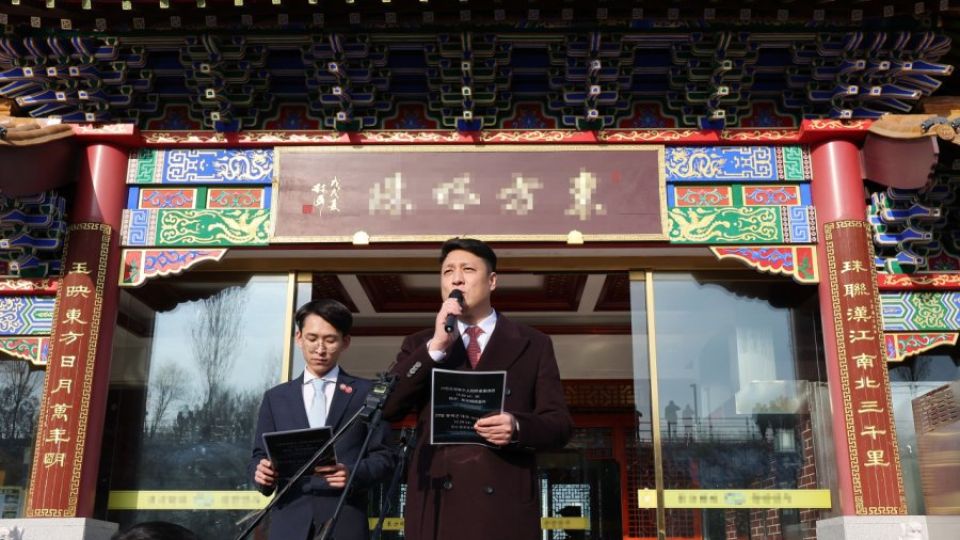December 30, 2022
SEOUL – The owner of a Chinese restaurant in southern Seoul on Thursday requested for police protection, denying media reports that it may be one of the overseas fronts for China’s secret police.
Holding a press conference at his eatery Oriental Pearl Tower in Jamsil-dong, Songpa-gu, the owner, identified as Wang, called the allegations “unjust.”
The man said there will be another press conference on Saturday for which reporters are required to pay to attend.
“The (Oriental Pearl Tower) restaurant runs an authentic business, but the news report made it a topic of conversation,” Wang said. “There is a great interest related to this matter and many have applied to attend (the press conference), but due to safety concerns and limitations in space, we will only accept 100 reporters. For fairness, we will sell the tickets (for the press conference) at 30,000 won ($23) per person.”
Citing an unnamed intelligence source, Chosun Ilbo reported last Friday that Korean authorities were looking into suspicions that Wang’s place may be a local front for China’s secret police.
The report came after a Madrid-based nonprofit group called Safeguard Defenders announced in early December that China was running at least 102 “overseas police service centers” in 53 countries including South Korea to watch and silence critics of the Chinese Communist Party.
Laura Harth, campaign director of Safeguard Defenders, told The Korea Herald that South Korean authorities have not yet contacted the nonprofit group for more information or cooperation.
“Korean authorities have not yet reached out to Safeguard Defenders, but we are confident in our hope relevant Korean authorities will coordinate and exchange information with like-minded democratic partners around the world to ensure thorough investigations into China’s transnational repression and undue influence operations,” she said in an email interview.
Aides to two senior legislators on the parliamentary intelligence committee — Rep. Kwon Seong-dong of the People Power Party and Rep. Youn Kun-young of the Democratic Party — told The Korea Herald they had no information regarding the reported investigation.
Officials at Seoul’s Foreign Ministry have told reporters there was nothing they can confirm.
The Chinese Embassy in Seoul has strongly protested the accusation that it was running “secret police stations” in South Korea, calling on media outlets to stop “deliberately perpetuating groundless rumors.”
A spokesperson for the Chinese Embassy said last Friday that China adheres to the principle of nonintervention in domestic affairs, strictly abides by international law and respects other countries’ judicial sovereignty.
The official added that Chinese security personnel and prosecutors have maintained a high level of cooperation with their South Korean counterparts by establishing close communication channels.
In an earlier briefing, China’s Foreign Ministry spokesperson flatly denied the existence of overseas police stations.
Harth at Safeguard Defenders claims, however, that the group’s findings appear consistent with “repeated statements by China’s local public security authorities” that these “overseas police service centers” were set up in close cooperation with the United Front Work Department, a CCP organization that seeks to influence various public and private sector entities outside China, including but not limited to political, commercial and academic spheres.
“The UFWD promotes efforts that align policies and activities with CCP interests, and seeks to divide and silence CCP critics. It is evident any probe starting from our report on the ‘overseas police service stations’ should encompass both the wider transnational repression issue as well as the other interference these networks are engaged in on behalf of the CCP — including, but not limited to, the Confucius Institutes,” she said.
China’s state-funded overseas culture and language education centers called Confucius Institutes have been closing down in Western countries as US and European authorities have concluded them as fronts for Chinese propaganda, surveillance of Chinese students abroad and collection of high-grade academic information.
There are 23 Confucius Institutes in South Korea, 22 of which are within national or private universities.
In regards to the recent allegations surrounding the Songpa-based Chinese restaurant, a rumor surfaced that South Korean talent agency Fantagio — most well-known for managing singer and actor Cha Eun-woo — was involved in its operation. The suspicion stems from the fact that a person reportedly involved with the operation of the restaurant had formerly been an outside director of the South Korean agency.
Fantagio on Thursday released an official statement denying such suspicion.
Wang said he ran Chinese restaurants in Garibong-dong, Seoul, and Bucheon in Gyeonggi Province before he expanded to travel, interior construction and media businesses.
The restaurant on a floating island on the Han River is registered as a branch of “HG Culture Media,” the head office of which is on the ninth floor of a building on the street in front of the National Assembly in Yeoui-do.
The restaurant, which has suffered some bad reviews on Naver, said it will operate only until the end of December, after the news report last week.
Opened in 2018, the restaurant saw operating losses of 230 million won in 2018, and 686 million won in 2019. As of 2019, its outstanding debt (1.32 billion on) was more than double the value of its assets (559 million).


